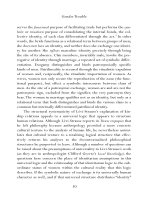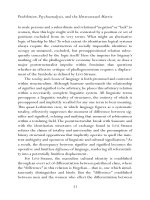GENDER TROUBLE 134
Bạn đang xem bản rút gọn của tài liệu. Xem và tải ngay bản đầy đủ của tài liệu tại đây (20.67 KB, 1 trang )
Prohibition, Psychoanalysis, and the Heterosexual Matrix
mally, the loss of sanctions. Not to have social recognition as an effective heterosexual is to lose one possible social identity and perhaps to
gain one that is radically less sanctioned.The “unthinkable” is thus fully
within culture, but fully excluded from dominant culture. The theory
which presumes bisexuality or homosexuality as the “before” to culture and then locates that “priority” as the source of a prediscursive
subversion, effectively forbids from within the terms of the culture the
very subversion that it ambivalently defends and defends against. As I
will argue in the case of Kristeva, subversion thus becomes a futile gesture, entertained only in a derealized aesthetic mode which can never
be translated into other cultural practices.
In the case of the incest taboo, Lacan argues that desire (as opposed
to need) is instituted through that law. “Intelligible” existence within the
terms of the Symbolic requires both the institutionalization of desire
and its dissatisfaction, the necessary consequence of the repression of
the original pleasure and need associated with the maternal body. This
full pleasure that haunts desire as that which it can never attain is the
irrecoverable memory of pleasure before the law. Lacan is clear that
that pleasure before the law is only fantasized, that it recurs in the infinite phantasms of desire. But in what sense is the phantasm, itself forbidden from the literal recovery of an original pleasure, the constitution
of a fantasy of “originality” that may or may not correspond to a literal
libidinal state? Indeed, to what extent is such a question decidable within the terms of Lacanian theory? A displacement or substitution can
only be understood as such in relation to an original, one which in this
case can never be recovered or known.This speculative origin is always
speculated about from a retrospective position, from which it assumes
the character of an ideal.The sanctification of this pleasurable “beyond”
is instituted through the invocation of a Symbolic order that is essentially unchangeable.49 Indeed, one needs to read the drama of the
Symbolic, of desire, of the institution of sexual difference as a selfsupporting signifying economy that wields power in the marking off of
99









